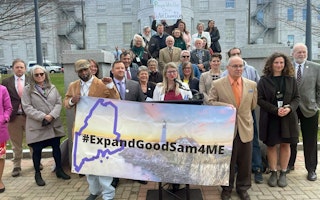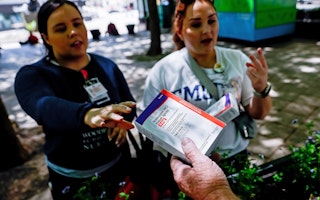Drug Policy Reform = HIV Prevention
By Jack Grundy
Chris Ford is a physician and founder of International Doctors for Healthy Drug Policies (IDHDP). She has been working with drug users for over 20 years and is recognized as an expert in harm reduction around the world. She discussed her work recently with Jack Grundy of TalkingDrugs, a project funded by the Open Society Foundations.
How did your work as a doctor lead you to consider the importance of drug policy reform?
I became increasingly aware over the past few years there is a wide divide between what we know works and use in practice; and drug policy made by non-clinicians and politicians who have no background in practice and don't meet and work with people who use drugs and/or are in treatment.
Then at the International Harm Reduction Association conference in Bangkok last year, hearing a policy maker who had no understanding that Opioid Substitution Treatment (OST) is an effective tool in HIV prevention saying that forcing people into abstinence was the only way—that spurred me into action. There are a number of well-established evidence-based interventions that reduce the harm of drug use to individuals and communities which are often ignored in the making of drug policy, and I feel doctors are in strong position to challenge this.
How does a criminal justice–based approach to drug use affect our capacity to tackle HIV/AIDS infection?
Injecting drug use and HIV are health and social problems, which need to be tackled through health and social routes. Criminalizing people who inject forces them underground and into dangerous practices to avoid the criminal justice system. Having laws and policy focused on law enforcement has been showed not only to be ineffective, but creates more violence in communities and fuels the increase in dru- related health problems including HIV.
This can be seen to be occurring in most countries at different levels; for example some countries use the death penalty, torture and/or imprisonment for using drugs whereas others, for example the UK, fail to provide needle and syringe programs in prison. Both these examples have devastating effects on individuals and communities.
What are the goals for International Doctors for Healthy Drug Policies, and how would you like to see the organization develop?
Our goal is to increase the participation of medical doctors in drug policy reform. Because of the gap between evidence-based practice and drug policy in most countries, we aim to lobby internationally to promote harm reduction and create healthy drug policies. We believe that doctors are in a strong position to help to achieve this. We also want to support doctors in their home countries or regions by having core objectives/position statements, which promote harm reduction and healthy drug policies.
The organization's network is also for medical doctors to share expertise and good practice in reducing the health social and economic harms of people who use drugs, with them at the center as well as being a source of information for our fellow doctors about policy reform and harm reduction.
The interest in and the rapid growth of the network since establishing it last year has been very encouraging, not to mention hugely exciting! Future development plans include establishing a communications strategy and using technology to reach our global membership; outreach to countries that are currently under-represented on the list (e.g., developing countries) and to become a lobbying presence—as a group of people who actually work with people who use drugs and therefore have more experience of it than most.
Your organization supports the Vienna Declaration. Why would you urge others to do the same?
Yes, we support the Vienna Declaration fully and encourage all others to sign. We have distributed it through all our networks. The declaration fits completely with our aims by calling for the incorporation of scientific evidence into illicit drug policies.
Jack Grundy is a volunteer with TalkingDrugs, which produces content on drug policy reform in over 20 languages.


